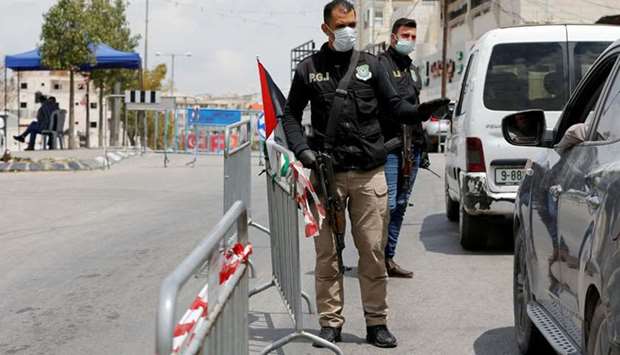Palestinian President Mahmoud Abbas has extended to June 5 a state of emergency declared in areas under his administration in the occupied West Bank in response to the coronavirus crisis, the official news agency Wafa said yesterday.
First announced two months ago, the state of emergency heralded a full lockdown that confined Palestinians to their homes, except for essential travel.
Border crossings with Israel and Jordan were closed.
But conditions were eased last month, with some businesses allowed to open in the hope of reviving the paralysed Palestinian economy.
Mosques and educational institutions remain closed and Palestinian authorities are still banning public congregations.
The Palestinians have reported 345 coronavirus cases and two deaths in the West Bank, where some 3mn Palestinians live.
In the Gaza Strip, a Palestinian territory under the control of Hamas, 17 cases have been reported among a population of some 2mn.
Hamas has shuttered Gaza’s mosques and schools and restricted large gatherings, but said a full lockdown was not necessary.
The West Bank and Gaza are 40km apart and separated by Israel.
Scrambling to tackle Covid-19 in camps across the Middle East, the UN agency supporting Palestinian refugees said yesterday it only has enough cash to operate until the end of May because of American funding cuts, Reuters reported.
In 2018 President Donald Trump’s administration halted annual payments of $360mn to the United Nations Relief and Works Agency (UNRWA), which provides assistance to some 5.5mn registered refugees in the West Bank, Gaza Strip, East Jerusalem, Jordan, Lebanon and Syria.
Elizabeth Campbell, UNRWA’s director in Washington, told reporters that the loss of US aid had a “corrosive impact” on the agency’s ability to help vulnerable people.
“We are basically operating on a month-to-month basis.
Right now, we have funding to pay our 30,000 healthcare workers until the end of this month,” Campbell said in a Zoom conference call from Washington.
She said UNRWA had only secured a third of its $1.2bn annual budget and that it was suffering its “worst financial crisis” since beginning operations some 70 years ago.
The agency is trying to plug the $800mn shortfall in part by appealing for emergency donations, Campbell said.
Palestinian refugees are mostly descendants of some 700,000 Palestinians who were driven out of their homes or fled amid fighting in the 1948 war that led to Israel’s creation.
Nearly a third live in 58 camps where UNRWA provides services.
Many refugees fear the dwindling aid they receive could fall further as the coronavirus crisis persists and donors shift priorities.
UNRWA has tried to halt the spread of Covid-19 in and around camps, closing all its 276 schools that are attended by close to 300,000 children.

Members of Palestinian security forces stand guard at a checkpoint as Palestinian President Mahmoud Abbas extended to June 5 a state of emergency in response to the coronavirus crisis, in Hebron in the occupied West Bank, yesterday.
